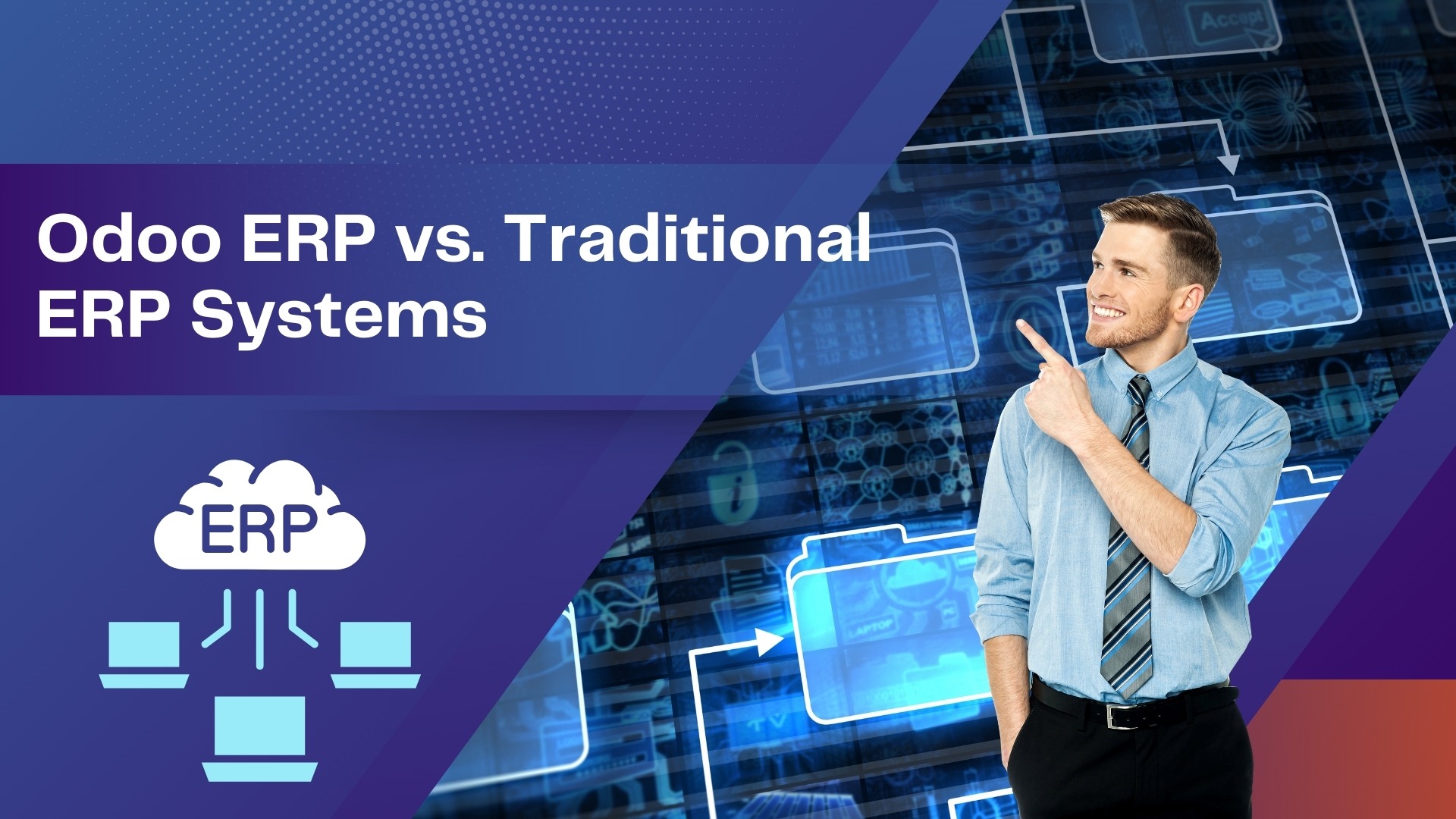Choosing the right Enterprise Resource Planning (ERP) system is a critical decision for any business. Traditional ERP systems have long been the go-to solution for large enterprises, but modern alternatives like Odoo ERP are changing the landscape with flexibility, cost-effectiveness, and ease of use. This blog compares Odoo ERP with traditional ERP systems to help you determine which is the best fit for your business.
1. Understanding ERP Systems
Traditional ERP Systems are robust software solutions designed to integrate and automate business processes across departments. Developed by industry giants such as SAP, Oracle, and Microsoft, they offer extensive functionalities but often come with high costs, lengthy implementations, and complex maintenance requirements.
Odoo ERP is a modern, open-source ERP solution that provides businesses with a modular, scalable, and cost-effective alternative to traditional ERP software. Designed for organizations of all sizes, Odoo allows companies to start small and expand as needed, offering flexibility and lower upfront investment.
2. Key Differences Between Odoo ERP and Traditional ERP Systems
2.1 Cost and Affordability
- Traditional ERP: High upfront licensing fees, ongoing maintenance costs, and expensive upgrades.
- Odoo ERP: Open-source with a one-app free plan and affordable paid plans. Users can start with the necessary app and easily add any of the 86 core modules at any time, all for the same per-user cost.
2.2 Implementation and Deployment
- Traditional ERP: Requires months (or even years) of implementation, with extensive customization and IT involvement.
- Odoo ERP: Faster deployment with cloud and on-premise options; modular structure allows gradual adoption.
2.3 Customization and Flexibility
- Traditional ERP: Highly customizable but complex, requiring dedicated IT teams and vendor support.
- Odoo ERP: Highly flexible and customizable with built-in apps and third-party integrations, allowing businesses to tailor solutions to their needs.
2.4 Scalability and Modularity
- Traditional ERP: Scalable but often requires extensive modifications and additional licensing.
- Odoo ERP: A Modular approach lets businesses scale by adding modules as they grow.
2.5 User Experience and Accessibility
- Traditional ERP: Generally feature-rich but may have a steep learning curve and outdated UI.
- Odoo ERP: It has an Intuitive and user-friendly interface with modern web-based accessibility.
2.6 AI and Automation Capabilities
- Traditional ERP: Limited AI capabilities unless supplemented with third-party tools.
- Odoo ERP: Integrates AI and automation for tasks like invoice processing, sales forecasting, customer support, and data-driven insights.
2.7 Maintenance and Support
- Traditional ERP: Requires in-house IT teams or vendor support contracts for maintenance and troubleshooting.
- Odoo ERP: Easier maintenance with community support, vendor assistance, and regular updates.
3. Comparing Odoo with NetSuite
NetSuite is a cloud-based ERP solution known for its strong financial management capabilities. However, its high cost and complex pricing structure often deter small and medium-sized businesses.
- Odoo ERP is a cost-effective alternative, especially with its free version and affordable paid pricing plans.
- Customization & Flexibility: Odoo’s modular approach allows businesses to tailor the system to their needs, offering greater flexibility than NetSuite’s standardized structure.
- Ease of Use: Odoo provides a more intuitive user experience compared to NetSuite’s steeper learning curve.
4. Comparing Odoo with SAP
SAP is a well-established ERP system widely used by large enterprises. While it offers powerful solutions, it comes with high implementation costs and complex integration processes.
- Cost-Effectiveness: Odoo is significantly more affordable than SAP, making it a better choice for SMBs looking for a scalable solution.
- Customization & Deployment: Odoo’s modular design ensures that businesses can start with essential features and expand gradually. SAP, on the other hand, requires extensive setup and long deployment timelines.
- Flexibility: While SAP is tailored for large enterprises, Odoo’s flexibility makes it a strong contender for businesses of all sizes looking for agility and cost savings.
5. Pros and Cons
Odoo ERP
✅ Cost-effective with open-source options
✅ Faster implementation and scalability
✅ Modern UI and ease of use
✅ Built-in AI and automation features
✅ Flexible and modular approach
✅ Out-of-the-box industry-specific features (may require advanced configuration)
Traditional ERP Systems
✅ Comprehensive and feature-rich
✅ Industry-specific modules for enterprises
✅ Established and widely used in large corporations
✅ Strong security and compliance capabilities
❌ High cost and complex implementation
❌ Requires extensive IT support and maintenance
❌ Limited flexibility in adapting to evolving business needs
6. Which ERP Is Right for Your Business?
Choose Odoo ERP If:
- You are a small/mid-sized/large business looking for a cost-effective solution.
- You need a modular, scalable system that grows with your business.
- You want a user-friendly interface with AI-powered automation.
- You prefer open-source flexibility and easy integration with third-party tools.
Choose Traditional ERP If:
- You are a very large enterprise with complex, industry-specific requirements.
- You need a highly structured and regulated system for compliance.
- Your company can afford the high costs of licensing, implementation, and maintenance.
- You have a dedicated IT team to manage the ERP system.
Conclusion
Both Odoo ERP and traditional ERP systems offer unique benefits, but the right choice depends on your business’s size, budget, and operational complexity. Odoo ERP stands out with its cost-efficiency, modular flexibility, and AI-driven automation, making it ideal for growing businesses looking for an agile solution. On the other hand, traditional ERP systems remain a powerful choice for large enterprises that require extensive customization, compliance features, and structured operations.
Before making a decision, carefully assess your business needs, scalability goals, and IT resources. Selecting the right ERP can significantly enhance productivity, streamline operations, and support long-term business growth.
Need expert guidance on choosing the best ERP for your business? Contact Cudio today for a tailored solution!




